Marines Korean War Beecher, IL Flight date: 06/14/23
By Al Rodriguez, Honor Flight Chicago Veteran Interview Volunteer
Fred Hoffmeyer was a young Marine when 70 years ago he was exposed to an atomic bomb test in the Nevada Testing Grounds. Despite that, he has lived a long and healthy life.
Fred was born in Lubbock, Texas. In 1933, his father — a Lutheran minister — was assigned to a church in Sigel, Illinois. In 1943 he was sent to St. Paul’s Lutheran Church in Beecher, Illinois. Fred and his two sisters finished their schooling in Beecher, graduating from Beecher High School in 1949.
In 1950 he went to work with the Public Service Company of Northern Illinois, later known as ComEd. On January 2, 1952, he was drafted along with his friend, Bill. PSC told him that they would have a job for him when he completed his military service. The induction center needed 20 percent of the men to volunteer for the Marine Corp. Bill volunteered and on a whim Fred did too. They were assigned to Marine Corps Recruit Depot San Diego for basic training.
Their first Marine Corp experience was comfortably traveling to San Diego on a Pullman sleeper with a porter attending to their needs. Fred said it was a rude awakening when they reached boot camp. There was a lot of screaming and cussing at them by the Drill Instructors. They were loaded on to trucks to the base. Bill and he were separated into different platoons. Fred said at boot camp everyone was treated the same: badly. There was a civilian airport right next to the base and you could walk there and go AWOL, but that thought never occurred to him. He enjoyed the tough physical and mental training. He said it also helped to know that he had a good job waiting for him.
After boot camp he was sent to Fort Riley, Kansas, for military intelligence training. This was a 16-week course. At the mid-point, Marines took a comprehension test. Those who passed it stayed to finish the course. Those who didn’t were shipped out. Fred passed and completed the course. His first duty assignment was to Camp Lejeune, North Carolina. The Marines needed infantry so he was assigned to the 2nd Marine Division, 1st Battalion and 8th Marines Charlie Company for advanced infantry training.
This small arms training with M1 rifles, machine guns and light mortars would be used in assaults by air, land and water. Helicopters would take them to mock battle sites. The infantry would support tanks and on the sea they would climb down a ship’s ropes to a landing craft. He told me they climbed down in full packs and it was challenging to try to board a boat that was bobbing up and down with the waves moving it above and below you.
Charlie Company then received unique orders to Camp Desert Rock, Nevada, to participate in the atomic bomb testing. Fred said they were told to “pack up your stuff, you’re going to Nevada.” The Air Force flew them to New Mexico and then they were trucked to Camp Desert Rock. On April 18, 1953, he was part of a 2000 “Leatherneck” contingent sent to witness and participate in a mock ground-air assault on an objective near the center of the impact area of an atomic bomb test. About 4,000 yards from the bomb site they went into a five-foot trench and were ordered to get on their hands and knees and look towards the ground.
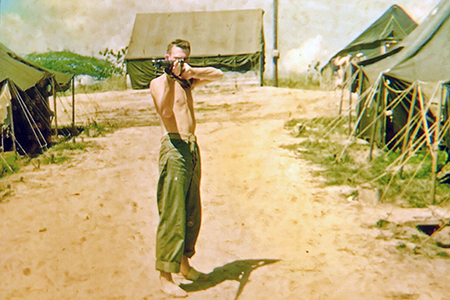
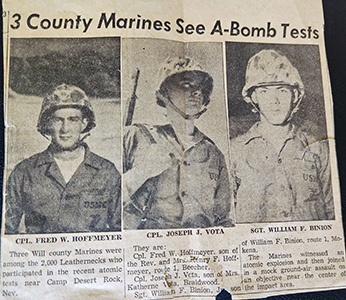
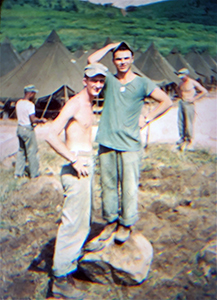
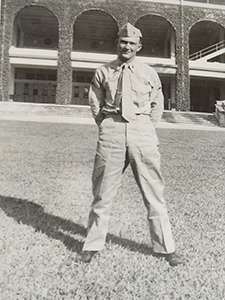
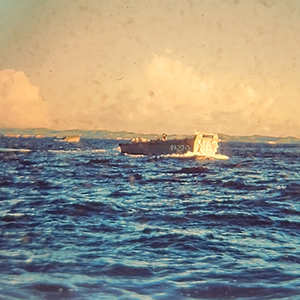
When the atomic bomb detonated they were told to close their eyes. They were not given any special equipment except on their khaki shirt there was something he said looked like a label. This would monitor his radiation exposure. Fred said 30 minutes before the atomic bomb test; the Air Force dropped a block buster bomb so that they could compare this blast to the atomic bomb blast. The block buster bomb could be heard but not felt from his position.
When the atomic bomb exploded, even with his eyes closed he could see red from the flash of light. Immediately after the blast, he could feel the heat going over the top of the trench. The sound from the explosion was like a heavy freight train going over him. When he was ordered up, Fred said he saw a very white mushroom cloud with the colors of the rainbow surrounding it. Any equipment that wasn’t behind a dune or in a trench was destroyed. He saw an unprotected cactus that was charred and glowing red. They were marched towards ground zero. The wind started blowing towards them and they were halted. Trucks came and took them back to Camp Desert Rock. There they were checked with Geiger Counters and then placed in a machine that tested them for three different types of radiation. He said that he heard them talking about his radiation levels, numbers that didn’t make sense to him. To his knowledge no one in Charlie Company experienced any immediate ill effects from the test. Later in life he and many others experienced bouts of cancer. About this experience he said: “In one way it was beautiful but powerful.”
Charlie Company was sent back to Camp Lejeune. There they participated in operations for improving land-sea-air coordination with the Fleet Marine Force Atlantic. These mock battles took them throughout the Caribbean. Fred’s service time was coming to an end when the 2nd Marine Division was to be deployed for duty in Korea but the war ended.
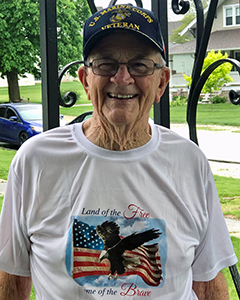
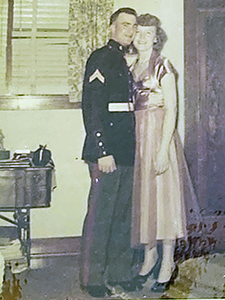
Fred was discharged and went back home to Beecher. He returned to his job and retired as a Crew Leader after 42 years. His girlfriend, Fern, was waiting for him and on May 9, 1954, they were married. They now have six children and eight grandchildren.
Fred’s had a busy life. He was diagnosed with an early stage of bladder cancer in 1990 but was treated successfully. After retirement during the summer months, he coached the Beecher Recreation Softball Team. He was also a part-time bus driver for the Beecher School District 200U, mostly for softball games. He is still involved with church activities. St. Paul’s Lutheran Church burned down two years ago but he cuts the grass for his new church. As a side note, the St. Paul Lutheran Church was used in the movie Road to Perdition. His hobbies are boating and fishing and also babysitting his grandchildren, though doesn’t have the time for any of that right now. His wife fell and injured herself. While she’s recovering, he’s busy being caregiver, as he says, “I’m busy babysitting us.”
Fred has been to D.C. before the World War II and Korean War memorials were built. He’s looking forward to seeing them and the Udvar-Hazy Air and Space Museum. He’s going on the flight with two buddies: Leonard Kregel has been his friend since he moved to Beecher as a kid and John Wierl is not only his friend but his barber who still cuts his hair to this day.
Thank you Fred and enjoy your day!


